Highly potent opioid found in fake oxycodone tablets
-
Notification
-
Opioids
-
- Wellington
A very potent opioid has been found in fake blue 30mg ‘M30’ oxycodone tablets being sold in the Wellington region.
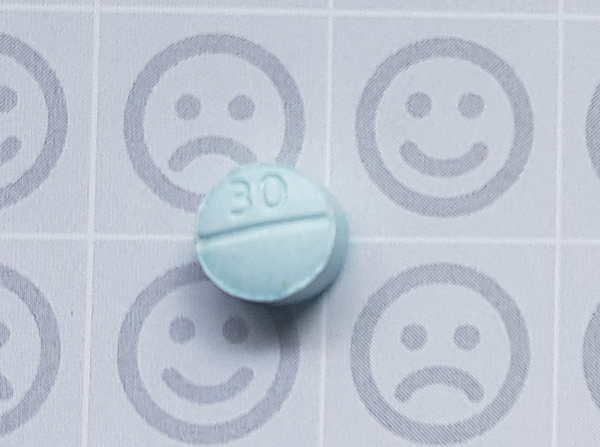
How to identify the drug
- Blue 30mg tablet
- Approx. half a centimetre in diameter
- Break line and the number 30 imprinted on one side
- A large letter M imprinted on the reverse
This notification is to advise that a very potent opioid, N-pyrrolidino etonitazene, has been found in fake blue 30mg ‘M30’ oxycodone tablets purchased in the Wellington region.
N-pyrrolidino etonitazene (also known as etonitazepyne) acts quickly to produce strong sedative/depressant effects. This substance has been linked to drug related deaths in North America and the United Kingdom.
High Alert strongly recommends people do not take these tablets. The tablets are visually recognisable and are not legally prescribed in New Zealand.
If you or someone you know take these tablets and start to lose consciousness or breathe slowly, call 111 immediately. Naloxone can be used to avoid the risk of overdose.
These tablets have been offered for sale on social media and have been available in the Wellington region. The tablets are not approved in this form in New Zealand and any sold here are almost certain to be fake.
This is the first time N-pyrrolidino etonitazene has been detected in New Zealand.
If you have heard of any reports of this drug, please let us know! The alert ID is N22/0024. All submissions are anonymous.
How to recognise symptoms of the drug
There is little information available about N-pyrrolidino etonitazene, however, the physical effects are likely similar to other synthetic opioids.
These effects include:
- Feeling euphoric or in a ‘dreamlike’ state.
- Sedation (‘the nod’ – being drowsy and then jerking awake).
- Temporary relief of pain, stress, or low mood.
- Itchiness (in one area or across whole body).
- Severe nausea and/or vomiting.
- Severe sweating or fevers.
- Slowed and/or difficulty breathing.
- Blue lips or fingertips.
- Cold and clammy skin.
- Pinpoint (tiny) pupils.
- Becoming unresponsive and/or losing consciousness.
How to reduce harm from the drug
High Alert strongly urges people not to take this substance at all.
Avoid combining with other depressant drugs including other opioids, alcohol, barbiturates, gabapentinoids, thienodiazepines, benzodiazepines, GHB/GBL and ketamine as these can increase the dangerous effects of opioids (for example, slowing or stopping breathing).
A lethal dose of N-pyrrolidino etonitazene is equivalent in size to a few grains of salt. Pharmacological data suggests this opioid exhibits potency similar to etonitazene, which is approximately 20 times more potent than fentanyl. Fentanyl test strips can't detect N-pyrrolidino etonitazene or other ‘nitazenes’.
Fake oxycodone pills that have been illicitly manufactured often have unpredictable dosages, resulting in unintentional overdosing. Internationally, many pills have been shown to have varying doses even within the same batch.
Have the opioid overdose reversal drug naloxone with you and use it if someone is overdosing from opioids – it can save their life. High potency opioids like N-pyrrolidino etonitazene may require more than one dose of naloxone.
Check with your local needle exchange outlet to see if they have naloxone available.
It can be difficult to recognise an opioid overdose. If you aren’t sure whether someone is overdosing, it is best to act like they are. It important to act quickly if you think someone is overdosing as it improves their odds of survival. Call 111 and ask for an ambulance immediately. Don’t leave the person alone.
The signs of an opioid overdose include:
- The person's face is extremely pale and/or feels clammy to the touch.
- Their body goes limp.
- Their fingernails or lips have a purple or blue colour.
- They start vomiting or making gurgling noises.
- They cannot be awakened or are unable to speak.
- Their pupils become very small.
- Their breathing and/or heartbeat slows or stops.
Find out more about nyxoid and nyloxone on the NZ Drug Foundation’s website, The Level.
If you have heard of any reports of this drug, please let us know through the Report unusual effects page, the alert ID is N22/024. All submissions are anonymous.
Stay safer by staying informed. Sign up to receive alerts and notifications about any dangerous drugs in NZ. Check out the alerts page to see what we've already found.
The National Poisons Centre is available 24/7 to help members of the public and healthcare professionals with clinical advice for exposures to this, or any other substance - please call 0800 764 766 (0800 POISON).
Are you concerned about your own drinking or drug taking? Reach out to the Alcohol Drug Helpline on 0800 787 797, or text 8681. You'll be able to speak with a trained counsellor who can provide you with helpful information, insight and support. They’re available 24/7, all calls are free and confidential.
You can also chat to the Alcohol Drug Helpline team online through the website, or:
- Call the Māori Line on 0800 787 798 for advice and referral to kaupapa Māori services.
- Call the Pasifika Line on 0800 787 799 for advice and referral to services developed for Pacific people.
- Call the Youth Line on 0800 787 984 for advice and referral to services for young people.
Latest Alerts & Notifications
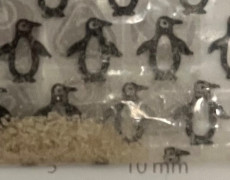
Alpha-PVP like substance misrepresented as MDMA in Christchurch
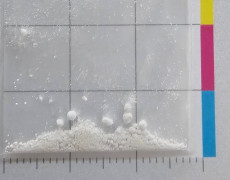
Heroin sold as ketamine in Auckland region
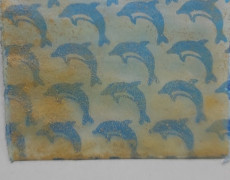
Highly potent synthetic opioid misrepresented as butonitazene
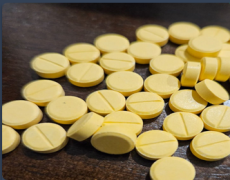
Fake oxycodone tablets linked to serious harm

